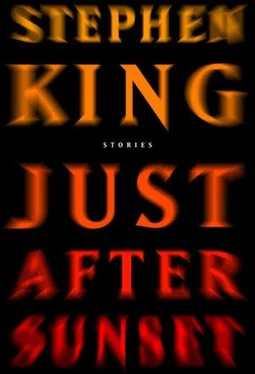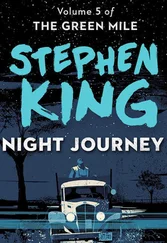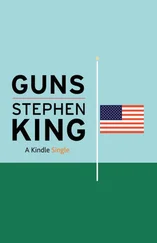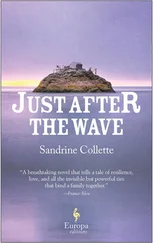Stephen King - Just After Sunset
Здесь есть возможность читать онлайн «Stephen King - Just After Sunset» весь текст электронной книги совершенно бесплатно (целиком полную версию без сокращений). В некоторых случаях можно слушать аудио, скачать через торрент в формате fb2 и присутствует краткое содержание. Город: New York, Год выпуска: 2009, ISBN: 2009, Издательство: SCRIBNER, Жанр: Ужасы и Мистика, на английском языке. Описание произведения, (предисловие) а так же отзывы посетителей доступны на портале библиотеки ЛибКат.
- Название:Just After Sunset
- Автор:
- Издательство:SCRIBNER
- Жанр:
- Год:2009
- Город:New York
- ISBN:978-1-4391-2548-9
- Рейтинг книги:5 / 5. Голосов: 1
-
Избранное:Добавить в избранное
- Отзывы:
-
Ваша оценка:
- 100
- 1
- 2
- 3
- 4
- 5
Just After Sunset: краткое содержание, описание и аннотация
Предлагаем к чтению аннотацию, описание, краткое содержание или предисловие (зависит от того, что написал сам автор книги «Just After Sunset»). Если вы не нашли необходимую информацию о книге — напишите в комментариях, мы постараемся отыскать её.
Just After Sunset — читать онлайн бесплатно полную книгу (весь текст) целиком
Ниже представлен текст книги, разбитый по страницам. Система сохранения места последней прочитанной страницы, позволяет с удобством читать онлайн бесплатно книгу «Just After Sunset», без необходимости каждый раз заново искать на чём Вы остановились. Поставьте закладку, и сможете в любой момент перейти на страницу, на которой закончили чтение.
Интервал:
Закладка:
Sometimes there were signs nailed to trees where other roads crossed the one he was on. CASCADE ROAD, one said. HERKIMER, 120 MI., read another, this one pocked with old bullet-holes. The signs always corresponded to the information on the plat map currently tacked to the alcove wall. He had already decided that, once he reached Herkimer, he’d push on into the Canadian wilderness without even a stop to buy souvenirs. The road stopped there, but that was no problem; he’d already gotten a book titled Plat Maps of Eastern Canada . He would simply draw his own road on the plats, using a fine blue pencil and putting in lots of squiggles. Squiggles added miles.
He could go all the way to the Arctic Circle, if he wanted to.
One evening, after the alarm went off and startled him out of his trance, he approached the projection and looked at it for several long, considering moments, head cocked to one side. Anyone else would have seen very little; up that close the picture’s trick of forced perspective ceased working and to the untrained eye the woodland scene collapsed into nothing but blobs of color — the light brown of the road’s surface, the darker brown that was a shallow drift of leaves, the blue-and gray-streaked green of the firs, the bright yellow-white of the westering sun to the far left, perilously close to the door into the furnace-room. Sifkitz, however, still saw the picture perfectly. It was fixed firmly in his mind now and never changed. Unless he was riding, of course, but even then he was aware of an underlying sameness. Which was good. That essential sameness was a kind of touchstone, a way of assuring himself this was still no more than an elaborate mind-game, something plugged into his subconscious that he could unplug whenever he wanted.
He had brought down a box of colors for the occasional touch-up, and now, without thinking too much about it, he added several blobs of brown to the road, mixing them with black to make them darker than the drifted leaves. He stepped back, looked at the new addition, and nodded. It was a small change but in its way, perfect.
The following day, as he rode his three-speed Raleigh through the woods (he was less than sixty miles from Herkimer now and only eighty from the Canadian border), he came around a bend and there was a good-sized buck deer standing in the middle of the road, looking at him with startled dark velvet eyes. It flipped up the white flag of its tail, dropped a pile of scat, and was then off into the woods again. Sifkitz saw another flip of its tail and then the deer was gone. He rode on, giving the deer-shit a miss, not wanting it in the treads of his tires.
That night he silenced the alarm and approached the painting on the wall, wiping sweat from his forehead with a bandanna he took from the back pocket of his jeans. He looked at the projection critically, hands on hips. Then, moving with his usual confident speed — he’d been doing this sort of work for almost twenty years, after all — he painted the scat out of the picture, replacing it with a clutch of rusty beer cans undoubtedly left by some upstate hunter in search of pheasant or turkey.
“You missed those, Berkowitz,” he said that night as he sat drinking a beer instead of a V-8 juice. “I’ll pick ’em up myself tomorrow, but don’t let it happen again.”
Except when he went down the next day, there was no need to paint the beer cans out of the picture; they were already gone. For a moment he felt real fright prod his belly like a blunt stick — what had he done, sleepwalked down here in the middle of the night, picked up his trusty can of turp and a brush? — and then put it out of his mind. He mounted the stationary bike and was soon riding his old Raleigh, smelling the clean smells of the forest, relishing the way the wind blew his hair back from his forehead. And yet wasn’t that the day things began to change? The day he sensed he might not be alone on the road to Herkimer? One thing was beyond doubt: it was the day after the disappearing beer cans that he had the really terrible dream and then drew the picture of Carlos’s garage.
IV. Man with Shotgun
It was the most vivid dream he’d had since the age of fourteen, when three or four brilliant wet-dreams had ushered him into physical manhood. It was the most horrible dream ever, hands down, nothing else even close. What made it horrible was the sense of impending doom that ran through it like a red thread. This was true even though the dream had a weird thinness: he knew he was dreaming but could not quite escape it. He felt as if he’d been wrapped in some terrible gauze. He knew his bed was near and he was in it — struggling — but he couldn’t quite break through to the Richard Sifkitz who lay there, trembling and sweaty in his Big Dog sleep-shorts.
He saw a pillow and a beige telephone with a crack in the case. Then a hallway filled with pictures that he knew were of his wife and three daughters. Then a kitchen, the microwave oven flashing 4:16. A bowl of bananas (they filled him with grief and horror) on the Formica counter. A breezeway. And here lay Pepe the dog with his muzzle on his paws, and Pepe did not raise his head but rolled his eyes up to look at him as he passed, revealing a gruesome, blood-threaded crescent of white, and that was when Sifkitz began to weep in the dream, understanding that all was lost.
Now he was in the garage. He could smell oil. He could smell old sweet grass. The LawnBoy stood in the corner like a suburban god. He could see the vise clamped to the work-table, old and dark and flecked with tiny splinters of wood. Next, a closet. His girls’ ice-skates were piled on the floor, their laces as white as vanilla ice cream. His tools hung from pegs on the walls, arranged neatly, mostly yard-tools, a bear for working in his yard was
(Carlos. I am Carlos.)
On the top shelf, far out of the girls’ reach, was a .410 shotgun, not used for years, nearly forgotten, and a box of shells so dark you could barely read the word Winchester on the side, only you could read it, just enough, and that was when Sifkitz came to understand that he was being carried along in the brain of a potential suicide. He struggled furiously to either stop Carlos or escape him and could do neither, even though he sensed his bed so near, just on the other side of the gauze that wrapped him from head to foot.
Now he was at the vise again, and the .410 was clamped in the vise, and the box of shells was on the work-table beside the vise, and here was a hacksaw, he was hacksawing off the barrel of the shotgun because that would make it easier to do what he had to do, and when he opened the box of shells there were two dozen of them, fat green buggers with brass bottoms, and the sound the gun made when Carlos snapped it closed wasn’t cling! but CLACK! and the taste in his mouth was oily and dusty, oily on his tongue and dusty on the insides of his cheeks and his teeth, and his back hurt, it hurt LAMF, that was how they had tagged abandoned buildings (and sometimes ones that weren’t abandoned) when he was a teenager and running with the Deacons in Po’-town, stood for LIKE A MOTHERFUCKER, and that was how his back hurt, but now that he was laid off the benefits were gone, Jimmy Berkowitz could no longer afford the bennies and so Carlos Martinez could no longer afford the drugs that made the pain a little less, could no longer afford the chiropractor that made the pain a little less, and the house-payments — ay, caramba, they used to say, joking, but he sure wasn’t joking now, ay, caramba they were going to lose the house, less than five years from the finish-line but they were going to lose it, si-si, señor, and it was all that fuck Sifkitz’s fault, him with his fucking road-maintenance hobby, and the curve of the trigger underneath his finger was like a crescent, like the unspeakable crescent of his dog’s peering eye.
Читать дальшеИнтервал:
Закладка:
Похожие книги на «Just After Sunset»
Представляем Вашему вниманию похожие книги на «Just After Sunset» списком для выбора. Мы отобрали схожую по названию и смыслу литературу в надежде предоставить читателям больше вариантов отыскать новые, интересные, ещё непрочитанные произведения.
Обсуждение, отзывы о книге «Just After Sunset» и просто собственные мнения читателей. Оставьте ваши комментарии, напишите, что Вы думаете о произведении, его смысле или главных героях. Укажите что конкретно понравилось, а что нет, и почему Вы так считаете.












